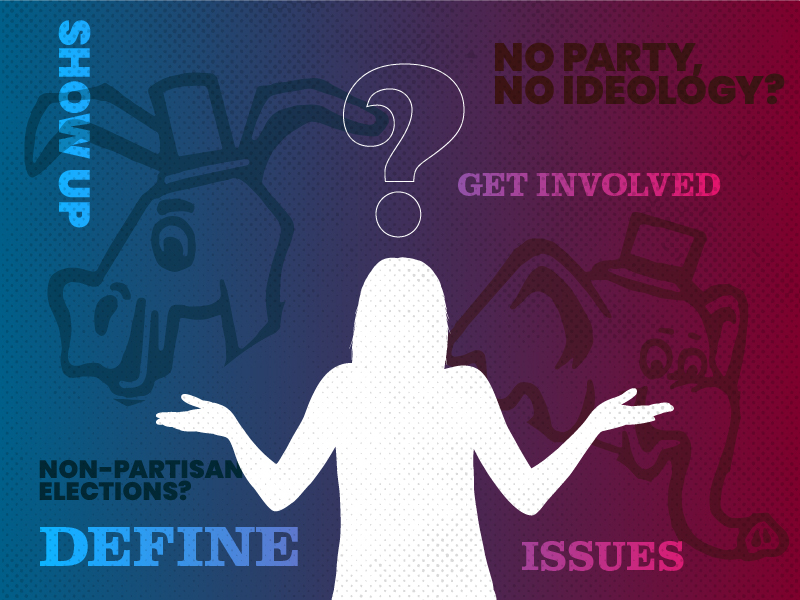
No Party, No Ideology? Think Again.
We work on a lot of non-partisan elections, down-ballot county and municipal campaigns across the country —including campaigns for judge, sheriff, county executive, school board, city council, and mayor. While candidates for races like these do not run with a political party designation, don’t let the absence of party labels fool you into thinking you can run a campaign without staking out your ideology. In local non-partisan elections, ideology matters—and so does having a vision that spans beyond anti-Trumpism. Because nonpartisan officials control budgets and make a real impact in our local communities, it is worth your time as a candidate in one of these races to cultivate a clear and appealing platform in your campaign.
Define who you are. When you declare your candidacy in a non-partisan election, you won’t have Republican or Democrat next to your name on the ballot for those looking for shortcuts to decide how to vote. However, your neighbors, local political parties, and allies know who the liberal, moderate, and conservative candidates are in your race. They don’t need a D or an R next to your name to tell them that you’ll be on their side. Define who you are as a candidate early, and don’t shy away from staking out your ideology in non-partisan elections.
Do your homework. Define where you are on the ideological spectrum in non-partisan elections before your opponent or an outside group does it for you. In these types of races, third-party groups can play a prominent role if they decide to get involved. Build a coalition that transcends partisan labels and anti-Trumpism to show your community whose voices you will amplify as a leader through your actions. Use issues and affiliations with groups to define your candidacy and your vision. Early voter contact and personal relationships can make a huge difference in these local and non-partisan races, so don’t wait to stake out your ideology in a clear and compelling manner.
Build your coalition. Coalitions matter a great deal in municipal elections for a host of reasons: Early support can build momentum, name recognition, and volunteer power. Coalitions help develop pockets of support, and in a low-turnout election, your coalition can make a good percentage of your vote goal.
Get endorsements. Endorsements matter in nonpartisan elections. Organizations have a vested interest in their members turning out in primaries and will put resources into turnout and education on elections that matter to them—this is ultimately another reason to run with a clear platform. Voters, donors, and volunteers likewise look at who is supporting candidates and use their alignment to decide where they should put their energy. The voices of endorsers can be powerful to use in campaign testimonials, harnessing and broadcasting public support.
Build from the ground up. Even while garnering endorsements, you will need your own political operation that is visibly independent and acting with momentum. The organizations that endorse you will energize the grassroots side of your campaign but will want to see that you are not solely reliant on them for visibility.
Focus on who turns out and who you want to turn out. Turnout is usually much smaller in off-year nonpartisan elections than in primary and general elections. Getting a segment of general election or primary voters to vote in your election can make a big difference, so work your local network and define a group of voters that it makes sense for you to connect with.
Fundamentals matter. People, time, and money are core parts of campaigns that cannot be ignored. Use the time you have to build resources and power. Field outreach and fundraising matter: Start early, and don’t let up as you build incrementally and maintain momentum into the election.
Issues can be a substitute for party. Make it clear to folks that you’re engaged by showing up for the issues you care about at community events, forums, club meetings, coffees, and beyond. When you’re running for office at the local level, your neighbors will want to hear about the change you hope to make to their day-to-day lives. Talk about the issues that matter to your community and be clear where you stand on them—especially compared to any other candidates running against you.
Don’t ignore party—but don’t rely on it either. Folks who are invested in politics stay invested. Parties understand how important smaller races are and often try to play a role in them both to wield power and to source candidates for other races. Using existing party structures as an organizing tool can be a big help, but you cannot count on them as the engine of your campaign. While you will need your own operation, existing party networks can supplement your hard work.
Bottom Line: Non-partisan races are great ways to make an impact, but understanding how to use resources will make a big difference in the outcome of your election.
Have questions about non-partisan elections or need help? Drop us a note!